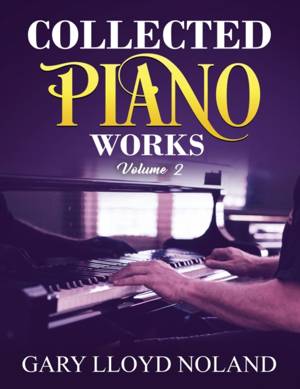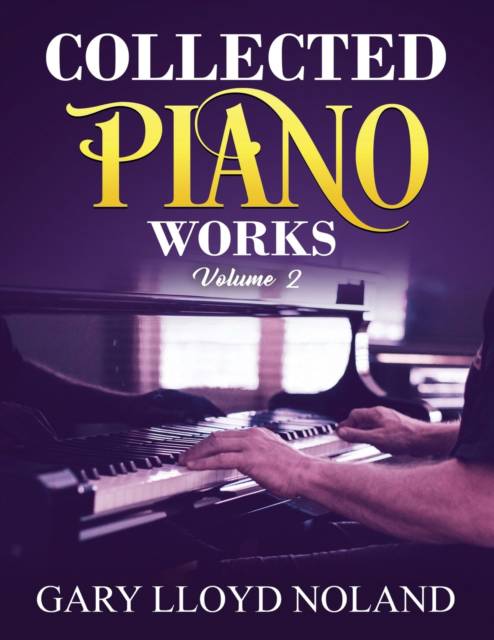
- Afhalen na 1 uur in een winkel met voorraad
- Gratis thuislevering in België vanaf € 30
- Ruim aanbod met 7 miljoen producten
- Afhalen na 1 uur in een winkel met voorraad
- Gratis thuislevering in België vanaf € 30
- Ruim aanbod met 7 miljoen producten
Omschrijving
Composer Gary Lloyd Noland's COLLECTED PIANO WORKS: Volume 2 includes his epic-length 39 VARIATIONS ON AN ORIGINAL THEME IN F MAJOR Op. 98, his super-virtuosic GRANDE RAG BRILLANTE Op. 15, his GOLDEN GATE RAG Op. 123, and several other heretofore unpublished works for piano.
39 VARIATIONS ON AN ORIGINAL THEME IN F MAJOR Op. 98 is, at approximately two hours duration, one of the lenghiest and most challenging sets in the history of the genre. It has been described by composer Ernesto Ferreri as "an historical variation set for piano, a true descendant of the Goldbergs and Diabellis, beautifully targeted to an apotheosis of supreme grandeur." Composer/pianist Ludwig Tuman described it as "an astounding tour de force. In its far-reaching, systematic exploration of the theme's creative possibilities, as well as in the inexhaustible imagination brought to bear, it reminds one of the Goldberg and the Diabelli. But in its monumental dimensions it goes far beyond them both, and in the large number of historical styles referenced and integrated into the work ... I am unaware of any parallel. I especially enjoyed the consistent use of certain features of the theme, regardless of the style or the type of tonality, pantonality or atonality employed-among them the melodic turn, the phrases ascending by whole steps, and others. I offer my humble congratulations on a titanic achievement!"
Ragtime pianist Mark Lutton once described GRANDE RAG BRILLANTE Op. 15 as "the most difficult ragtime piece of all time ... The audience needs to have Attention Hyperabundance Disorder. (It's fine if, like me, your idea of a nice short little piece is a tone poem by Richard Strauss.)" The Canadian pianist and composer Max Keelyside described it as "the work of a musician's musician." GRANDE RAG BRILLANTE received its official world premiere on KPFA Radio on 4 October, 1991 in celebration of the inauguration of Pacifica Radio's (then) sparkling new facility in Berkeley, California. It was "performed" on a computer-driven Yamaha Disklavier. This historic premiere, paired with the premiere of a (then) new work by Lou Harrison, was later written up in Nicolas Slonimsky's MUSIC SINCE 1900 (an encyclopedic compendium that chronologically lists premieres of compositions that its author deems to be among the most significant and noteworthy of the 20th century). Ernesto Ferreri wrote, "Only a musical maniac could push something this far ... at times the rags fugue and the fugues rag into waves of improbable climaxes ... noticed a double fugue with the rag theme ... and you gotta love how it detours around atonality ... brillante indeed!" The late Slovak composer and conductor Ladislav Kupkovic (1936-2016) once wrote to Noland: "...Ihre Musik ist wunderschön, 'Grande Rag Brillante' ist ein Meisterwerk; als auch Komponist bin ich voll Neid, dass ich so etwas nicht schreiben kann. Ich wünsche Ihnen viel Erfolg! Ich komponiere schon viele Jahre europäisch tonal und es ist nicht leicht, so zu komponieren in einer Welt, die noch in der atonalen Ideologie denkt. Ich hoffe, Ihr Weg wird leichter." Here is a link to a rendition of GRANDE RAG BRILLANTE: https: //soundcloud.com/gary- noland/grande-rag-brillante-for-piano-op-15.
GOLDEN GATE RAG Op. 123 was originally sketched out in 1974 and underwent significant revisions in 2021. This is the first time it has appeared in publication.
THREE MEDLEYS from VENGE ART comprise a series of strung-together musical excerpts from various works by Richard Strauss, Mahler, Korngold, Schönberg, Berg, Beethoven, J.S. Bach, Brahms, Karol Szymanowski, Mozart, and Hugo Wolf.
The recently revised THREE INCONGRUISMS Op. 122 (2021) are derived from various unfinished compositions by Noland dating back to the late 1970s and mid 1980s.
Specificaties
Betrokkenen
- Uitgeverij:
Inhoud
- Aantal bladzijden:
- 286
- Taal:
- Engels
- Reeks:
- Reeksnummer:
- nr. 2
- Leeftijd:
Eigenschappen
- Productcode (EAN):
- 9781732302396
- Verschijningsdatum:
- 26/11/2021
- Uitvoering:
- Paperback
- Formaat:
- Trade paperback (VS)
- Afmetingen:
- 216 mm x 279 mm
- Gewicht:
- 666 g

Alleen bij Standaard Boekhandel
Beoordelingen
We publiceren alleen reviews die voldoen aan de voorwaarden voor reviews. Bekijk onze voorwaarden voor reviews.







